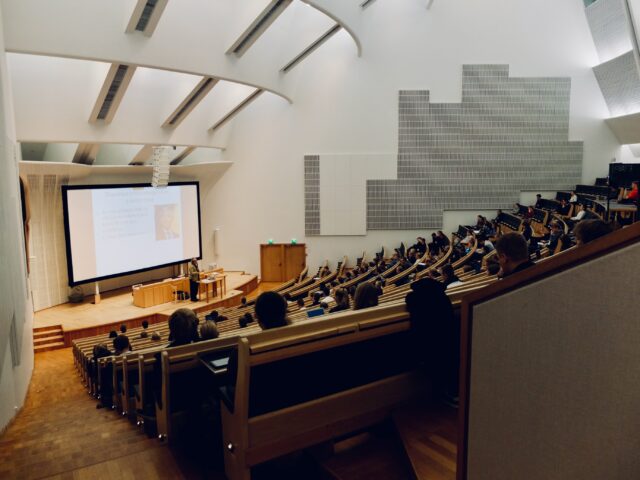Following a recent CBC article highlighting the difficulties faced by Ukrainians in Saskatchewan who wish to pursue postsecondary education, the Government of Saskatchewan has announced changes to tuition policies. While people with refugee status typically study as domestic students in Canada, Ukrainians who arrived under the Canada-Ukraine Authorization for Emergency Travel (CUAET) program are reportedly not considered refugees. After the CBC article was released, SK issued a statement that it would provide funding to ensure that those who came to Saskatchewan under CUAET pay only domestic tuition rates. “These students are in a unique situation,” commented SK Advanced Education Minister Gordon Wyant. “We want them to be able to continue living here to study at one of our excellent post-secondary institutions without causing severe financial hardship for their families.”

Top Ten News
May 12, 2023
The Government of Manitoba has increased its Research Manitoba funding to $13.6M in 2023-24, an increase of $1.55M or 13% from the previous year. This funding aims to strengthen the provincial research ecosystem and support strategic investments in research and innovation. “This important increase in funding will allow Research Manitoba to continue to advance our province’s research enterprise, support Manitoba’s innovators to grow Manitoba’s economy, and develop research talent for today, tomorrow, and future generations to come,” said Research Manitoba CEO Karen Dunlop. Dunlop emphasised that this investment will advance research and innovation opportunities for Indigenous students and scientists and support Indigenous-led projects.
Dalhousie University has announced that it will host the new Beaty Centre for Marine Biodiversity, thanks to an $8.2M gift from entrepreneur and conservationist Ross Beaty. The Centre–which is set to open in early 2025–will be a public-facing interactive space from which students and community members can learn about the marine-biodiversity crisis. Planned exhibits include a life-sized kelp forest, a climate change sphere, and educational displays about species facing extinction. “The Beaty Centre for Marine Biodiversity will provide an incredible opportunity for all Dalhousie students to come face-to-face with the rich diversity of marine life that exists in Nova Scotian waters,” said Dal Associate Professor Dr Derek Tittensor.
In a recent editorial, Colleges and Institutes Canada (CICan) President Denis Amyot reflects on Canada’s trades sector and argues that work must be done to ensure it reflects the diversity of the country’s communities. She calls attention to the nation’s shortage of skilled trades workers, asserting that the sector is challenged by associated stigmas, misconceptions, and limitations on access. Amyot maintains that a resolution lies in offering high-quality, hands-on training for underrepresented groups in the trades, like women and Indigenous peoples. She also identifies CICan’s Career Launcher Apprenticeships program as part of the solution, highlighting the initiative’s mandate to help employers in the trades hire first-year apprentices, especially those from equity-deserving groups.
York University’s Schulich School of Business has announced the launch of a new MBA in Technology Leadership (Tech MBA). The 16-month program, which is reportedly the first of its kind in Canada, will prepare leaders for a technology-driven business world. The curriculum will cover topics such as leadership development, ethics and technology, digital economics, and digital transformation management. Students will take part in a guaranteed workplace internship, interact with industry leaders, and receive dedicated career support through the Tech MBA’s Professional Development Hive. The Tech MBA will launch in Fall 2023.
In a recent article for Nature, Christine Ro discusses how scientists are using WhatsApp to conduct research, communicate with each other and the public, and reach those in need. Ro writes that some scientists use the platform specifically because it uses so little mobile data and operates in many rural regions. For researchers Holly Bik and Virginia Schutte, who were travelling to East Antarctica, this was particularly important because the application could still function in the Southern Ocean. Ro writes that some researchers also use WhatsApp for collaboration and as a way of collecting survey responses. The app can also be used by health professionals to monitor patients and as a “workspace” for votes, updates, instructions, and project management. The author notes that though the app is widely used, it is banned in locations such as mainland China.
The University of Saskatchewan has partnered with the City of Saskatoon to prevent litter from entering the South Saskatchewan River. Together, USask and the city will embark on a two-year pilot project that uses trash-trap nets attached to outfalls to capture debris before it enters the river. USask staff and students will then collect and analyze the contents of the nets to better understand the river’s sources of pollution. “We hope that this research will help the City understand the sources of pollution better, with the ultimate goal of controlling it before it can enter the river,” said USask Associate Professor Dr Kerry McPhedran.
College of the Rockies will be expanding its Invermere campus in collaboration with David Thompson Secondary School (DTSS). The two institutions currently share a building: The college will take over the high school’s current art room and modernize the space to support COTR’s enrolment growth. In turn, COTR will build DTSS a brand-new art room using a $3.8M investment from the Government of British Columbia. “With the introduction of new programming like our Hospitality Management diploma, and subsequent enrolment growth, space is extremely constrained, limiting the campus’ course offerings and availability,” said COTR Director of Facilities Allan Knibbs. “This expansion is expected to address these issues.”
Memorial University has reaffirmed its decision made last fall to drop the Ode to Newfoundland from its convocation ceremonies. CBC reports that the Government of Newfoundland and Labrador had requested that Memorial reconsider the decision. The university reportedly considered changing part of the lyrics, but has since confirmed that it will not play the Ode during this year’s ceremony because it does not reflect the campus community. “The decision to remove the Ode to Newfoundland from convocation was intended to create safer and more welcoming spaces for all students,” said Memorial President Neil Bose. Both sides of the House of Assembly objected to Memorial’s decision and Tourism Minister Steve Crocker has called for the decision to be reversed.
In the Chronicle of Higher Ed’s new advice column, Kevin Dettmar responds to a question about how to get faculty who are on nine-month contracts to answer their emails over the summer. The author writes that while important academic business sometimes comes up over the break, faculty members who not contracted during the summer are not obligated to respond. Dettmar recommends that university chairs plan ahead and ensure top-priority business is conducted during the school year, prior to the break. In the scenario that work is still required of faculty members over the summer, Dettmar underlines that contract faculty must be appropriately compensated for their off-contract time.
